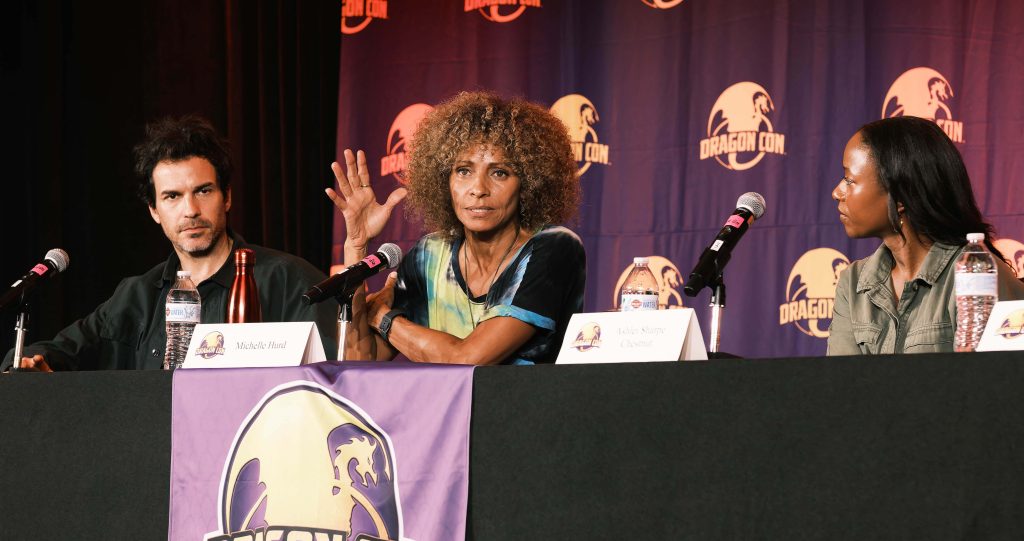The Trek track took over the Courtland Grand ballroom Friday at 2:30PM to welcome Santiago Cabrera, Ashlei Sharpe Chestnut, and Michelle Hurd from Star Trek: Picard for a sweeping Q&A. Steve Denham, who moderated the session, facilitated the conversation.

The session began with an interesting question about the way in which the actors managed and maneuvered in the “space” of the set. Fans know that Hurd’s character, Raffi Musiker, did a lot of work with virtual “screens” of data, rapidly moving from screen to screen with a mere flick of a finger or swipe of a hand. The reality was that all the swipes and gesticulations were Hurd. There was minimal guidance (except to ask her to “tone it down” a bit for a second take). Both Hurd and Chestnut commented on the dynamic of using their imagination and playing with the space of the set.
Each actor had their own journey to Star Trek. Hurd time and again referred to herself as a fan of the franchise. As a small child her father insisted that she and her sisters watch Star Trek because of Nichelle Nichols’ role as Nyota Uhura. Her father understood the importance of representation, and in the character of Uhura, his daughters saw an African American woman in a position of authority and power. Hurd pointed out that this wasn’t a woman as “concubine” or “servant” but rather an intelligent, highly skilled professional serving at the highest level of responsibility. She had authority and place. Her father understood how important it was for his daughters to see her… to see themselves represented in that way.
Chestnut’s mom is a huge fan of Star Trek and served as her gateway to the franchise. In fact, her mother helped her prepare for the audition. Chestnut didn’t know the specifics of the part she was auditioning for. When her agent called to tell her that she was going to play the role of Geordi LaForge’s daughter Sidney and get to work alongside both Levar Burton and his biological daughter Mica, she and her mother celebrated. Chestnut described the moment, and the realization of the role she’d won, as “surreal.”
For Cabrera, winning the role of Cristóbal Rios brought him to Star Trek. To prepare he watched a lot of Star Trek and dove deep into its underlying philosophy. He sees this as the foundation, the underpinning of the entire endeavor. In fact, when asked about Rios being left in the 21st century (which in Star Trek lore is among the most violent and destructive periods ever) and what he would bring to the people of that age, Cabrera replied simply with “hope.”
Hope for a better life, and the determination to act in order to make that hope real, dominated Hurd’s response to a question about her service as a SAG-AFTRA leader during the recent writers and actors strike. Hurd emphasized the need for everyone to “know your worth” regardless of your profession. She was proud of union membership, declaring that workers had to be supported, and the maintenance of a viable middle class was a cause worth fighting for.
Hurd inherited her activist spirt from her father Hugh Hurd. A very successful actor in his own right, Hurd fought racial discrimination against African Americans in both the profession and America at large. He was an early and passionate supporter of Martin Luther King, Jr., fundraising on his behalf in the 1950s.
The actors would love to return to Star Trek if the opportunity were to present itself. They called upon the fans to let the producers know that they’d like to see more. Terry Matalas, the creative force behind Star Trek: Picard has referred to a sequel he has called Star Trek: Legacy. The series would tell the story of Captain Seven of Nine and the adventures of the USS Enterprise G. Perhaps there, Hurd noted, such a series would provide the opportunity to explore the relationship between Mussiker and Seven further. When asked about the way the character’s relationship “fell by the wayside” in season three of Star Trek: Picard, Hurd pointed out that Matalas wanted season 3 to be a “love letter” to Star Trek: The Next Generation. His intent was to give the series the goodbye it deserved. Achieving that dominated the story telling and screen time. As a result, her character’s relationship with Teri Ryan’s Seven got pushed down the priority list.
Since 1968, fans have played a key role in preserving, protecting, and promoting the Star Trek franchise. That truth shows no sign of fading. All three panelists are offering photo sessions, can be found at the Walk of Fame, and will appear together Sunday at 1:30PM in the Marriott Atrium Ballroom.
